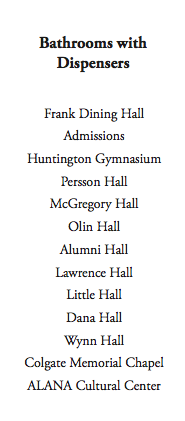Club Formed from Menstrual Product Initiative Works to Destigmatize Menstruation

Period Progress
Progress Period, a student group that works to destigmatize menstruation, held its first meeting February 21 to begin working to bring equal access to menstrual products on campus.
The group’s work will compound on previous efforts by seniors Cate Barber and Laia Alonso Marmelstein and junior Hannah Adkins, who brought hygiene product dispensers to over a dozen restrooms on campus.
Barber, the founder of the group, has worked on the initiative for the past two years. The effort began before Barber arrived at Colgate.
“This project was a conversation brought up when I was a sophomore that was passed down to me from someone who was a senior,” Barber said. “We’ve been talking with administration for the past two years and I kind of decided we needed a bigger group on campus and we need more mobilization and more people involved.”
According to Barber, there are currently free menstrual products in at least one bathroom in every academic building, and in a total of 15 bathrooms across campus.
Barber noted considerable barriers in getting free menstrual products in bathrooms on campus, particularly from the administration.
“A lot of people don’t want to talk about periods, and the higher ups within our institution are men, so that has definitely been a barrier. Talking about these conversations with men, getting them to acknowledge it as a real problem…there has been some pushback from the administration, especially from people who don’t necessarily believe menstrual equity is a right,” Barber said.
First-year Ellen Sojka attended the club’s first meeting February 21 and said that her
impressions of the barriers involving the administration have much to do with the stigmatization of menstruation.
“The issue isn’t just with [funding]. The issue is also with comfortability and access for people who menstruate who don’t identify as women. The first step should be getting products in gender neutral bathrooms so everyone has access, but we need the support of the administration to do so,” Sojka said.
Sojka joined the club after learning about the prevalence of period poverty in one of her classes.
“When I heard that Progress Period was starting, I immediately wanted to join to not only help alleviate the burdens of pe- riod poverty, but to also create easier access to products that allow people to attend school, to attend work and to live their lives,” Sojka said.
Barber said she was very pleased with the enthusiasm at the club’s first meeting.
“It was so nice to see that there’s other people interested in this, and the drive that other people have. Seeing [first-years] and sophomores get involved in this is so exciting to me because I think it’s something we need to talk about and I love talking with people from other classes,” Barber said.
Sojka said she feels excited and optimistic about the future of the group.
“I’m really excited for Progress Period, as I think [Barber] has a good plan for the future. We have a good group work- ing toward this one goal, and I think we know what it takes to make the change that’s needed,” Sojka said.
Contact Kirby Goodman at [email protected].

Kirby Goodman is a senior from Minneapolis, Minnesota concentrating in peace and conflict studies with a minor in political science. She's previously served as...






